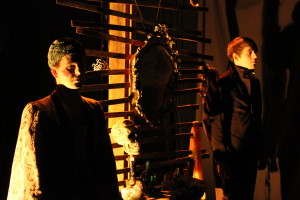 Boy players compete for coveted female role in Unsex’d
Boy players compete for coveted female role in Unsex’d
Published October 24, 2013 by Kathleen Renne in FFWDWeekly Theatre
Calgary’s Third Street Theatre, along with Whitehead’s Lethbridge-based Theatre Outré, are presenting the play in the Epcor Centre’s Motel theatre.
“It kind of started out as a lark between me and my friend. We were two gay men in a world that was trying to tell me that my effeminate nature would prevent me from having the career of a leading man,” says Whitehead. “That led me to think of a time in history when effeminate men were celebrated onstage.”
The result was Unsex’d, a play that takes place during the Elizabethan era, though Whitehead cautions against viewing the play as historically accurate. Unsex’d won Third Street Theatre’s New Queer Theatre Playwriting Competition last season, and since then it has been performed in Dublin, Halifax and Lethbridge.
The play is set during the 16th and 17th centuries in England, when women were prohibited from being actors. As such, all female roles were played by “boy players” — young, beautiful males with high-pitched voices who could convincingly portray women onstage.
In Unsex’d, the audience meets two of these boy players: one is a celebrated actor who is getting older and, perhaps, is “past his prime” when it comes to portraying young women; the other is a young, beautiful ingénue. Both are competing for the role of Lady Macbeth. (Hence the title of the play, a reference to Lady Macbeth’s famous line, “Unsex me here.”)
“The events of the play revolve around the very first production of Macbeth. We tell a fictional story of how Macbeth came to be,” says Whitehead.
As is commonly known in theatre circles, Macbeth bears a curse. Theatrical tradition dictates that the word Macbeth should never be spoken inside a theatre. In fact, even in conversation with theatre folk, euphemisms such as The Scottish Play and Mackers are used to refer toMacbeth.
“It’s a piece of theatre iconography people have pondered over and explored,” says Third Street Theatre artistic director Paul Welch. “Unsex’d puts an interesting and queer spin on a traditional superstition,” he adds.
In the play, the rivalry between the two players leads to the curse. Contributing to that rivalry is the fact that each is also vying for the Bard’s affections.
“There’s a lot of speculation around Shakespeare’s sexual orientation…. We are obsessed with him as a culture,” says Welch, referring to the sonnets Shakespeare penned for a man.
Whitehead says he also wanted to explore society’s obsession with youth, beauty and celebrity in Unsex’d, noting that women and gay men are often measured against a higher standard when it comes to beauty and physical perfection.
“An aging Elizabethan boy player who is washing up and a younger boy… a lot of people can relate to that. Our society is very ageist. As you get older, you fear the death of your social life, the decreasing relevance of your role in society, the waning of your sexual life,” says Welch.
Despite the show’s “poignant commentary” on society’s obsession with youth and beauty,Unsex’d remains a fun, campy ride. “It’s a silly kind of camp drag show on one side, but there’s also this spooky undertone to it,” Whitehead says, suggesting that it’s the perfect show to experience at Halloween.



